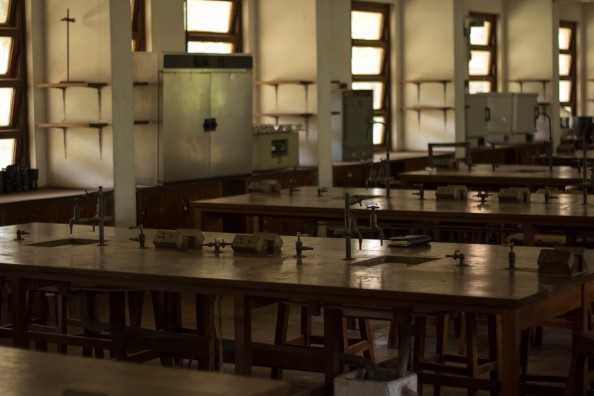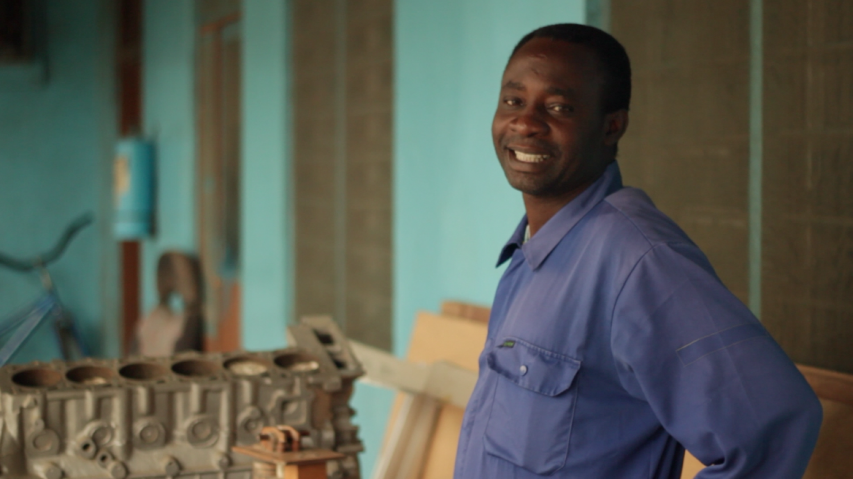Science in Ghana | an overview
It is exactly one year ago since I stepped out of the plane on Kotoka airport in Accra, Ghana. I was on a quest to track down Ghanaian scientists, hoping that they could share their thoughts on science and creativity. The Ghanaian way of dealing with challenges and problem-solving is one to watch. A year after date I present you my overview article.
*Ghanaian– perhaps “African”- but I cannot draw such conclusions from just visiting one country on an entire continent, although I have got my suspicions, let’s just say: To be continued for now.

The white lecture halls, offices, restaurants and shops bouncing off sharp sun rays, the occasional dance or gospel choir performances by students out and about after college time attributed to a tropical festive feel. Peeking through some of the dusty windows was almost like travelling back in time, in a retro kind of way, it looks nice (very East London hip), but they’re not really the ‘state-of-the-art’ scientific facilities that I know from the university I was trained at.
*Dusty– this Ghanaian red dust that is everywhere, especially where roads have not been paved, which is to some extent pretty much everywhere, makes it very challenging for scientists to keep the already scarce analytical research equipment operable. My camera is not a big fan of dust, but imagine what high end sensitive equipment would think of it. It is one of the many side effects of not having a perfect infrastructure and settling in old laboratory buildings in a dry and dusty environment.

One of the things I heard quite often is that education is not very hands-on, due to the fact that old-school ‘learn everything by heart’ tactics are applied in the classrooms and also because facilities for activities like experiments are not or barely present in schools. I think this is quite contradictory, since traditionally, kids are very much encouraged to be hands-on and learn directly from what their parents and grandparents do. Something I saw happening up North. The fact that schools generally are not offering practical skill development does definitely not help in stimulating students in moving towards research and innovation or thinking entrepreneurial.
*Entrepreneurial – I came across a few very good initiatives of young Ghanaians setting up their own businesses. One was the fast growing internet company Rancard, the other the Moringa seed processing company MoringaConnect. Both initiatives were initiated by young people who had lived and studied in the U.S. and came back with their expertise striving to contribute to their native country.

What I noticed among my peers (so say 20 somethings) is that most of them would want to work in finance, ideally for a bank or something similar. The guys and girls I met who wanted to pursue scientific research (could be biomathematical, materials engineering, anything really) each sounded more driven than all fellow students I knew in my home country put together. They had clear goals in which the main point was: To help developing their country and to give back to society.
*Society – I found that all research I came across was directly linked to society. A notion that for scientific research in other places often has to be put a lot of extra effort in to explain or valorise: “How is this research actually contributing to society?” Even in something sounding as abstract as “the Laser lab” I found that students and PhDs were developing analytical machines not aimed at some monopoly middle man who is the only one able to understand or invest in high end machines, but directed at the average farmer or person in the street to use in their daily life and business. It is an entirely different approach in which low key and low cost materials are being used and work; back to basics.

In Ghana, for most people, not having everything at your fingertips, no perfect roads, no chemical supplies around the corner, not the latest technology at their disposal, barely any money to invest, is pretty standard. Unless you have studied abroad, came back and found yourself without it again (even without whatever new work you developed and produced at the university abroad). What happens is that people start making things happen anyway. Albeit in a less “globally” conventional way. This results in creative solutions and innovative thinking that is bigger than most know or perhaps would want to see even.
To finish off I would like to quote Prof. Allotey who quoted Einstein to me: ““A knowledge is limited, but imagination has no limit.” So people should be encouraged to be more creative, more innovative and they will be rewarded for that.”
*Professor F.K. Allotey is a Ghanaian Physicist, but not just any, as I described in a post after meeting him. Soon it is possible to watch and listen to him (among many others you might reckognise from the posts) in the documentary “Multiverse Ghana” I am about to finish. Prof. Allotey is working hard, trying to find the new Einstein, who according to him, will come from Africa.



